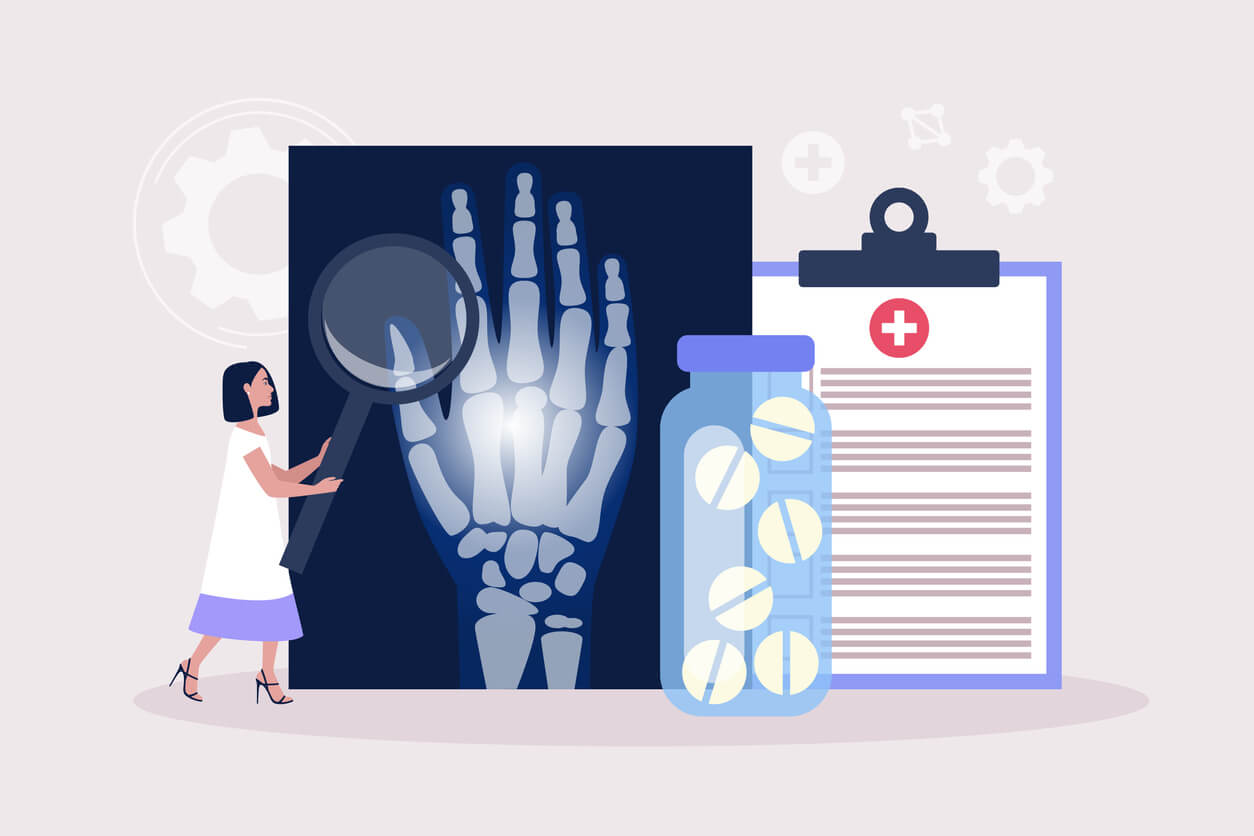What is carpal tunnel syndrome?
The carpal tunnel is a narrow passageway in the wrist formed by small bones (called the carpals) and a strong band of connective tissue. The tendons that bend your thumb and fingers and the median nerve travel through this tunnel.
The median nerve supplies feeling to the thumb, index finger, middle finger and half of the ring finger. It also controls movement of muscles at the base of the thumb.
Because the carpal tunnel has tight boundaries, anything that causes swelling or narrowing can raise pressure within it. Pressure on the median nerve leads to the symptoms of carpal tunnel syndrome.

Carpal tunnel syndrome symptoms
Symptoms typically affect the dominant hand (the one you use the most), but some people have symptoms in both hands. Carpal tunnel syndrome can progress over time, causing increasing loss of function. Untreated carpal tunnel syndrome can cause permanent damage to the median nerve. This can result in thumb muscle weakness and loss of feeling in the hand.
The symptoms of carpal tunnel syndrome include:
Pain in the wrist and hand
Shooting pains up the arm
Tingling or numbness in the fingers
Hand weakness
Swollen fingers
Difficulty grasping small items
Waking at night with pins and needles in the hand
What causes carpal tunnel syndrome?
People with diabetes, obesity, and thyroid gland problems may be at higher
risk
of carpal tunnel syndrome.
It is more common in women and older people. Often an exact cause cannot be identified. However, most
cases of
carpal tunnel
syndrome are linked to a
range of factors.
These include:
Genetics/heredity
Traits that run in families, such as a smaller carpal tunnel, can make you more likely to develop the syndrome.Arthritis
Various forms of arthritis, especially rheumatoid arthritis, can lead to swelling and inflammation of the wrist.Repetitive hand use
Performing the same hand and wrist movements repeatedly over a long period may irritate the tendons in the wrist, leading to swelling and pressure on the nerve.Hand and wrist posture
Doing tasks that involve extreme hand or wrist positions over a prolonged period can increase pressure on the nerve.Pregnancy
Pregnancy hormones can lead to fluid retention, which can put pressure on the nerve.Wrist fractures
Bony fragments can cause irritation and take up space within the carpal tunnel.How is carpal tunnel syndrome diagnosed?
A qualified healthcare professional such as your doctor can make the diagnosis. They will ask you about your symptoms, such as how they started and how they affect your daily life.
They will also look at your wrist and hand, checking for things like tenderness, swelling and painful or limited movement. You might be referred for nerve conduction tests, which look at how well electrical signals are travelling through the median nerve. This can confirm the diagnosis and establish the severity of the condition.
You might be referred to an orthopaedic hand specialist for an expert opinion and guidance with treatment decisions.
Carpal tunnel syndrome treatment
Treating carpal tunnel syndrome involves reducing inflammation, maintaining or improving hand function, and addressing anything that contributed to symptom development (such as repetitive movement patterns).
Non-surgical management of carpal tunnel syndrome
In its early stages, carpal tunnel syndrome treatment usually starts with nonsurgical measures.
Lifestyle changes
Modifying everyday activities can help to reduce pressure on the median nerve. For example, you may need to take regular work breaks, avoid activities that strain the wrists, change your posture and rest from repetitive movements.Physiotherapy or occupational therapy
A therapist can give you carpal tunnel syndrome exercises, such as gliding exercises that help the nerve move more freely in the carpal tunnel. They can also teach you how to modify activities to take pressure of the area.Medications
Your doctor might prescribe medications to ease pain, reduce swelling in the wrist and take pressure off the nerve.Injections
An injection of local anaesthetic and corticosteroid into the affected area may ease inflammation and swelling.Splinting or bracing
Wearing a splint or brace keeps your wrist in a neutral position, which can reduce pressure on the nerve. This can be especially helpful at night. It may also help to wear a brace or splint during the day if you’re doing tasks that aggravate your symptoms.Carpal tunnel syndrome surgery
Surgery might be advised if your symptoms are worsening or haven’t responded to conservative treatment. It is the most successful treatment for persistent cases of carpal tunnel syndrome, with a success rate of 80-90 per cent.
Surgery involves carefully releasing the ligament on the roof of the carpal tunnel. This increases the size of the tunnel, taking pressure off the nerve.
In most cases, surgery can be done under a local anaesthetic with sedation and does not require an overnight stay in hospital.
How long does it take to recover from carpal tunnel surgery?
You will need some help for the first two weeks after surgery while you keep the dressings clean and dry. After this, you’ll be able to get back to most of your usual activities, including light work as tolerated. It can take up to three months to regain full strength and movement in your hand.
Your doctor will talk to you about how long it might take you to recover from surgery and when you can return to work and leisure activities.
References
https://www.healthdirect.gov.au/carpal-tunnel-syndrome
https://www.betterhealth.vic.gov.au/health/conditionsandtreatments/carpal-tunnel-syndrome
https://orthoinfo.aaos.org/en/diseases--conditions/carpal-tunnel-syndrome/
Reviewed by Dr
Craig Timms, Neurosurgery at Holmesglen Private Hospital.
Our Hospitals
Find out more about the orthopaedic services at our hospitals.
NSW
Campbelltown Private Hospital
Hunter Valley Private Hospital
Nepean Private Hospital
Newcastle Private Hospital
Northern Beaches Hospital
Norwest Private Hospital
Prince of Wales Private Hospital Sydney Southwest Private Hospital
QLD
Brisbane Private Hospital
Gold Coast Private Hospital
Peninsula Private Hospital
Sunnybank Private Hospital
Contact Us
Need some assistance? For general queries on orthopaedic services at Healthscope, please contact us below. We're here to help.



